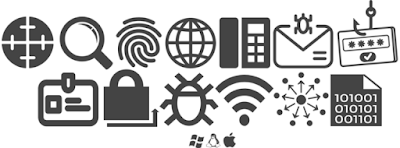What is Ethical Hacking ? - Free #Masterclass
Ethical
Hacking and Morality: The Gray Area
Put yourself on the path to becoming a bona fide ethical hacker
with this wall-to-wall master class. Covering everything from basic terminology
to advanced exploitation with frameworks like Metasploit, this training will
show you the tools and techniques these pros use to keep networks safe and beat
hackers at their own game.
Ethical hacking, better known as “penetration testing,” involves
purposeful “hacking” into a computer network by a qualified person for purposes
of testing a system’s security. A certified penetration tester with the full
knowledge of all parties involved typically does penetration tests
under contract.
Business
commerce, financial transactions, records, and communication are almost all
web/cloud-based now. Malicious hackers (black hats) attempt to steal money,
goods, or information. They can change records, exploit weaknesses, and
otherwise wreak havoc on businesses, computer users, and society in general.
To defend
against malicious hackers, qualified penetration testers (white hat hackers)
are being employed to defend systems. In fact, according to Market watch.com,
the demand for ethical hackers is increasing as cyber-attacks become more and
more catastrophic to large corporations.
The
problem that arises is this: Since ethical hackers are here to make sure that
the unethical hackers can’t hack us, who watches over the white hats to keep
them from becoming black hats?
A
competent penetration tester has to closely follow hacking trends, study new
exploits, read hacker forums, and skirt very near to the edges of the criminal
hacker fraternity to stay competent at his or her job all while maintaining
their integrity.
Social Engineering
The issue
becomes even more complicated when social engineering is thrown into the mix.
As computer security increases in effectiveness, black hat hackers have turned
their attention to the weakest link: people. Hacks on human beings are referred
to as social engineering.
For example,
a black hat hacker might impersonate a company’s IT service technician and ask
employees to log into accounts, read personal information aloud, or even verify
children’s names and birthdays (used by many people as passwords), addresses,
and Social Security numbers.
For penetration testers to duplicate hacking by way of social
engineering, they must also attempt to get personal information from employees
without their knowledge. Doing this, even in a controlled way, is viewed by
some as a violation of privacy. Nevertheless, some penetration testing
contracts include social engineering attempts.
A report by NASSCOM states that the country needs at least one
million skilled ethical hackers by 2020.
“To beat a hacker,
you need to think like a hacker”. Today, there is a huge demand for ethical
hackers in the market, who can not only safeguard the enterprises from
organized cybercrime groups but also assist them to assess their cybersecurity
preparedness. If you want to join this driving growth of Ethical Hacking,
Jetking shall help you set the first milestone in this domain.
ceh certification
WHY CHOOSE THIS COURSE
CEH course gives
“white hat” IT professionals a glimpse into the mindset of a typical hacker.
The focus of an IT professional is always on keeping and maintaining secure
systems. By learning the hacker's mindset, you’ll be able to take a more
proactive approach and see beyond current security tools and policies to know
where and how an attacker might try to gain access to a company's network.
What Will you Learn
1. Introduction
to Ethical Hacking.
2. Footprinting
and Reconnaissance.
3. Network
Scanning techniques and countermeasures.
4. Enumeration
techniques and countermeasures.
5. System
Hacking.
6. Malware
Threats and countermeasures.
7. Packet
sniffing techniques and defense against sniffing.
8. Social
Engineering techniques and countermeasures.
9. Denial
of Services and countermeasures.
10.Session
hijacking techniques and contermeasures.
11. Hacking Web servers and countermeasures.
12. Hacking Web applications and and
countermeasures.
13. SQL injection attacks and injection detection
tools.
14. Wireless Hacking and Wi-Fi Security tools.
15. Hacking Mobile platforms, mobile security
guidelines and tools.
16. Evading IDS, firewall and honeypots, evasion
tools and countermeasures.
17. Cloud computing threats, attacks, security
techniques and tools.
18. Cryptography.
19. Types of penetration testing and vulnerability
assessment.
How to
get started?
As per
official site Jetking there is no prerequisite to join CEH course. However,
basic knowledge of server and network is recommended.
·
Step – 1 To begin with, you
may want to start with basics and fundamentals to networking such as – Network+
or A+, even better option is to get CCNA and attain a tech support position.
·
Step – 2 Upon gaining some
experience, after few years you may now put efforts into earning basic security
certification and gain security position in an organization.
·
Step – 3 Meanwhile, working
at this position you may slowly want to concentrate on penetration testing and
learn tools of the trade and work towards gaining CEH (Certified
Ethical Hacker) offered by Jetking .
·
Step – 4 Now, you can begin
displaying yourself as an Ethical Hacker.
Register Here for King of Hardware and Networking Institutes Jetking
On 17th Nov 2018





Comments
Post a Comment